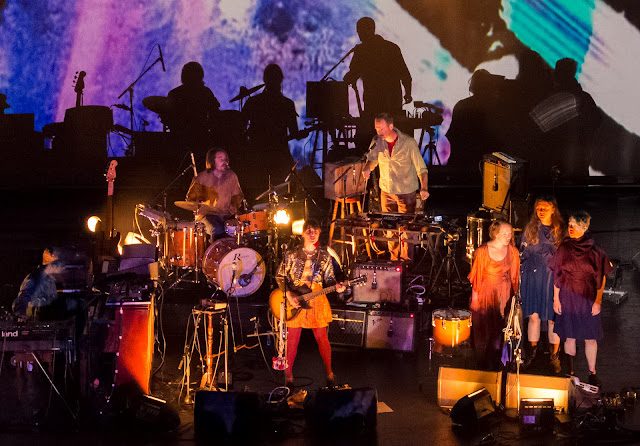This was my first return to this venue since a dismal evening with the Black Keys a few weeks ago, and true to form, door security did their best to make me feel unwelcome. That the touts outside were trying to unload tickets at below face value was none too encouraging either. Worse, I was once again seated up in the Circle, not in my preferred spot on the floor, albeit only 5 rows in. Fortunately the audience were far more attentive this time, and the atmosphere more conducive to music lovers. M. Ward from Portland, Orgeon, opened and was most notable for the vigour of his guitar playing. He's about to release his seventh album, A Wasteland Companion, and he delivered his folk with passion. Yet, he was confined to the corner of a dark stage crammed with Feist's gear, and his solo material was lost in this large space. I'd like to see him in more intimate circumstances, as all the signs are that he has charisma.
Feist immediately commanded the stage with Undiscovered First, aided by sophisticated lighting and a projection system. I find such technology a pale substitute for being close to the performers, yet even from afar, her energy on stage was easily apparent. She moved gracefully, and was accompanied by the magnetic, lively young trio Mountain Man. They filled out the vocal harmonies throughout, and graciously Feist gave them the opportunity to perform a solo number towards the end of her 90 minute set. She also brought a three piece backing band, including keyboard player, drummer and a multi instrumentalist (who memorably used a violin bow as a drum stick), but no bass player. I'd expected to see the strings and horns she uses in the studio, but this was still a rich, complex soundscape. Manchester was part of a multi-date tour, and I've previously found that everything can sounds too rehearsed in such circumstances. It was technically flawless, but there was thankfully enough of a mercurial improvisatory quality to avoid too studied a feel.
As she opened Graveyard, Feist remarked: 'you know when you start on an A minor chord that this is going to be a serious piece'. Whilst this is basic music theory, it does indicate that in no way does Feist patronise her audience. Her breakthrough was the song 1234 being aired in an Apple iPod Nano commercial, but her music is highly subtle, often oblique, sophisticated rather than crowd pleasing. This is particularly evident in the 2011 album Metals, which was performed in its entirety at this show. It's darker than her earlier writing, often a mixture of anger and sadness. The gloriously energetic A Commotion was full of chaos and noise, and exemplified the freeness with which Feist and her band where able to reinterpret these creations for an audience. Yet, the full force of the band was often held back (Get It Wrong Get It Right was centred on a tiny, quiet music box), so that it could be unleashed with real punch. Folk came to the fore in songs such as Anti Pioneer and Bittersweet Melodies, yet this is carefully crafted, sophisticated art music.
Feist's parents are both artists, and it's clear she's very conscious of the visual effect of her performance, particularly in the way that she projects her personality through her movements on stage; be it the shaking of her hair, stomping of the foot, or balletic dancing. She was also surprisingly engaging between songs, having the ability to transition seamlessly between talking and singing. She involved the audience in more than one sing along, even managing to get us to sing in harmony, and conveyed her cheerful Canadian amiability. Yet, if there was a doubt, it was the elusiveness of that distinctive, raspy voice in this large space. At times it felt as if such a delicate instrument was struggling to register with the microphone. It may have been a quirk of my position in the venue, but it's not the first time that I've complained about engineers recessing the lead vocals in the balance. This is a pity, as her intelligent lyrics should get equal billing with her glorious musicianship. Overall though this was a fine evening, which has led me to explore her back catalogue further, surely a sign that the live experience has deepened my appreciation of her art.
I can recommend the following interviews with Feist: this one about Metals from Pitchfork, and this from The Observer newspaper.





No comments:
Post a Comment